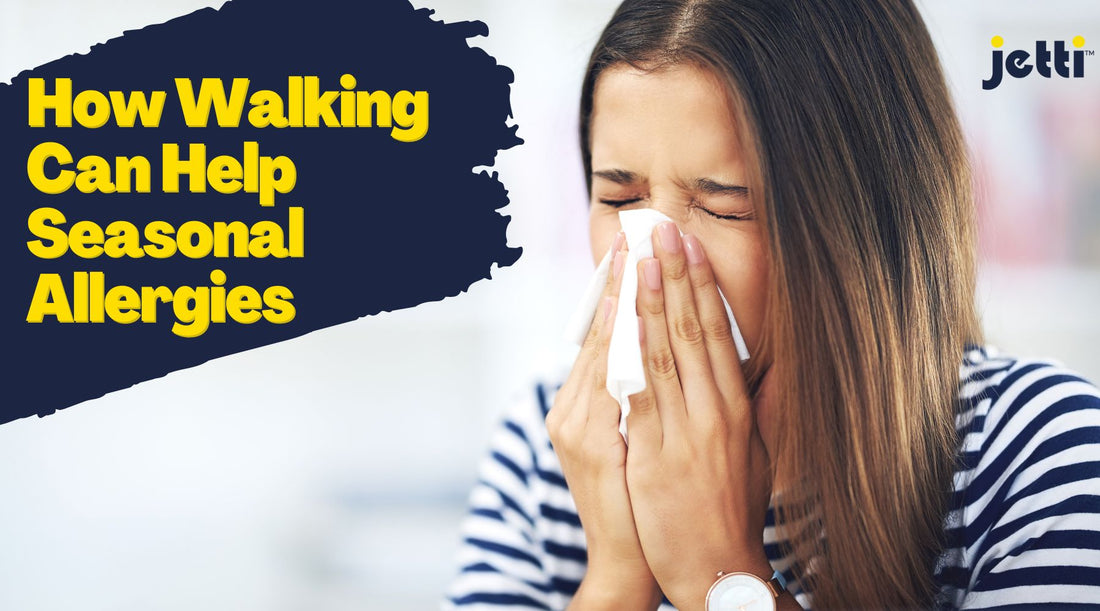After a long, cold winter, we can’t wait for Spring to arrive. With the change of seasons comes warmer weather, more sunshine, colorful landscapes, and—achoo!—seasonal allergies. There’s no doubt that this time of year calls us outside, but itchy, watery eyes and sniffling noses may make us think twice. But, think again. Walking outdoors may actually be just the thing to help beat those seasonal allergies.
Before you exit out of this window because you think we’ve lost our minds, we spoke with Dr. Alan Goldsobel with Allergy and Asthma Associates of Northern CA in San Jose, California to understand how walking helps combat seasonal allergies, and tips for making the best out of walking outdoors when the pollen count is high.
First, how does walking and exercising outdoors actually help? Dr. Goldsobel confirmed that research has shown that moderate and higher levels of exercise (outdoors or indoors) can decrease symptoms of allergic rhinitis. “Many people with chronically congested noses find the only time it is relieved is with exercise,” said Dr. Goldsobel.
But before you march outside, you may want to consider the time of day and the weather. Though Dr. Goldsobel is in favor of exercising whenever a person has the time, he also recognizes that in people with strong pollen allergy, exercising outdoors can be a problem. He said acute allergic symptoms can become present when pollen is deposited into nasal passages, the lining of the eyes, and into the lungs and on the skin.
So, when is the right time? “There is a lot of variability, but pollen (tree, grass, weed) levels are lowest early in the AM and at the later afternoon and evening, and so being outdoors, with or without exercise, is best at these times,” suggests Dr. Goldsobel. Windy days might also stir up pollen in the air making allergies flare up, but after rainfall, there will be less pollen in the air and may be the perfect time to head outside for that walk.
Besides paying attention to the time of day, there are also ways that you can limit the amount of allergens with which you come in contact. Wearing a hat, wrap-around sunglasses, mask or even goggles can help keep pollen out of your hair and eyes. “Many people observed that wearing a mask outdoors during the pandemic decreased their seasonal allergy symptoms,” said Dr. Goldsobel. And if one has bad ocular symptoms, wearing goggles can decrease the deposition of pollen onto the eyes.”
When walking outdoors during allergy season, you might also consider avoiding heavily wooded areas or large, grassy areas as they tend to be a breeding ground for allergens. However, large bodies of water tend to have a lower level of pollen, so head to the beach or a lake and take in the water view for your walk.
It’s always good to rinse off in the shower, change clothes after walking outdoors, and wipe down any gear you take on a walk. Dr. Goldsobel recommends taking it one step further. “Just like taking a shower, rinsing your nasal passages (and eyes) with salt water (i.e. neti pot or OTC sinus flush bottle) just after a walk outdoors can eliminate pollen from the nose and eyes, decrease the development of symptoms, and feels great!” he said.
Taking a walk outdoors might not always be the right answer, though. It’s important to know your limitations and how you’re feeling before setting out as exercising outdoors can worsen symptoms. “If one is already having a very bad day with allergy or especially asthma symptoms, it would be important to take your allergy and asthma medications and get your symptoms under better control before venturing outside in high pollen days,” said Dr. Goldsobel.
Sure, itchy noses and eyes are no fun, but the benefits you’ll get from a walk outdoors, even during pollen season, often outweigh the symptoms. And, you’ll have a chance to take in the colors and appreciate the beautiful blooms that the season brings.



